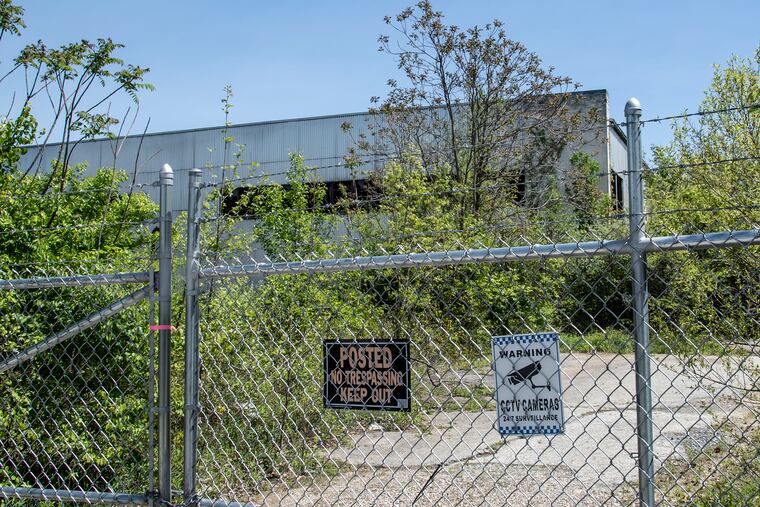Pa. announces $8 million cleanup plan for contaminated Bishop Tube site in Chester County
The site has been a focus of controversy since 2010 when plans to build housing there first emerged.

The Pennsylvania Department of Environmental Protection plans an $8 million cleanup of the contaminated Bishop Tube site in Chester County — a focus of controversy for 10 years when a company controlled by developer Brian J. O’Neill purchased it to build housing.
Constitution Driver Partners LP, O’Neill’s company, did not cause the pollution, and the property was already on the DEP’s list of brownfields approved for reuse as long as they are cleaned to state standards.
Still, residents and environmental groups have opposed building on the vacant industrial site where a number of contaminants are present in the soil, water and air inside the old buildings. The main contaminant of concern is trichloroethylene (TCE), a colorless liquid that can cause headaches, dizziness, and sleepiness in moderate amounts, and coma and death in large amounts. It is also linked to heart, liver, and kidney problems as well as cancer.
TCE has been found in excess of state allowable levels and was widely used in the process of making steel tubing at the 13.7-acre site in Frazer, East Whiteland Township, starting in the 1950s.
Maya van Rossum, head of the Delaware Riverkeeper Network, objects to the remediation plans, which were released last week, saying the DEP is “more concerned about prioritizing the goals and costs of the parties responsible for cleanup than the needs and safety of the impacted communities, including the current neighbors as well as future potential residents if the developer who wants to build homes on this site gets his way.”
Cleanup options
The DEP came up with the plan after hearing from the public in November 2021. It had a range of cleanup methods that cost anywhere from the low millions into the tens of millions.
Under its new cleanup plan, the DEP will remediate contaminated soil, groundwater, surface water at the Bishop Tube site, as well as one homeowner’s drinking water supply.
The DEP plans to inject chemical substances designed to render contaminants nontoxic. It will mix in other soil and monitor the site over the long term. It also says it will use specialized engineering methods and other ways to contain the contamination. It will connect a home with a contaminated well to a public water line.
Most of the methods it chose were among the lowest cost, though not always the very lowest. For example, its choice to clean up the groundwater by injecting it with compounds to make the contaminants inert will cost about $5.2 million.
The most expensive method, however, would cost $38 million. That would have required contractors to pump out the contaminated groundwater and treat it using specific filtering. The process would result in air emissions and sludge that would also have to be treated separately. The cleaned water would then have to be reinjected to the site.
The DEP believes its choices will meet state standards and were more cost-effective.
“This remediation plan represents the culmination of a thorough assessment and review of a complex site,” DEP Southeast Regional Director Pat Patterson said in a statement. “We believe this remedy selection will provide a comprehensive pathway for cleaning up and reusing the site in a way that is protective of public health and the environment.”
However, van Rossum said the site should be cleaned to “the highest cleanup methods and standards” and that the DEP was providing “a lower level of protection for communities and the environment.”
She also notes the plan failed to address PFAS contamination.
“This community has suffered enough. They deserve highest cleanup and highest protection as public natural open space,” van Rossum said.
A history of toxins
The site was in use from 1951 to 1999 and had multiple owners including J. Bishop, Johnson Matthey Inc., Whittaker Corp., Christiana Metals Corp., Alloy Steel Corp., and Marcegaglia USA.
Besides TCE, monitoring wells have found levels of fluoride, chromium, and nickel that exceeded standards. Other chemicals have also been detected at the site. The property is listed as a hazardous site under the state’s Hazardous Sites Cleanup Act.
The DEP used the act to sue previous owners to pay for the cost of cleanup, but that litigation is ongoing and it’s unclear who will pay and how much.